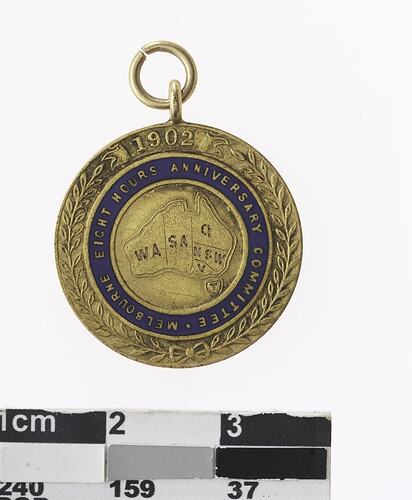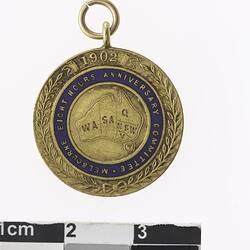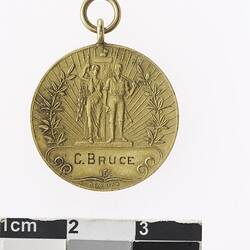Summary
Gold fob made for the Melbourne Eight Hours Anniversary Committee in 1902. It was made to commemorate the gain of the eight hour day in Victoria in 1856. It was presented to C. Bruce.
Action taken by stonemasons on 21 April 1856 led to the establishment of the Eight Hour Day, with the government agreeing that workers employed on public works should enjoy an eight hour day with no loss of pay. It was a world first and became emblematic of the rights of labour. In recognition of the significance of this achievement, April 21 was made a public holiday in 1879 and commemorative marches were held each year from 1879 until 1951. The Eight Hour Day holiday was renamed Labour Day in 1934. In 1955 the Labour Day march and celebrations were replaced by Moomba celebrations.
Physical Description
Circular gold fob with blue enamel ring and chain attachment. Obverse has map of Australia showing six states. Reverse shows female angel on left with male worker on right.
Obverse Description
Map of Australia showing six states, inscribed WA / SA/ Q / NSW / V / T. Around, blue enamel ring inscribed MELBOURNE EIGHT HOURS ANNIVERSARY COMMITTEE. Around ring, laurel wreath.1902 at top
Reverse Description
Winged Victory on left with male worker on right. Victory holds a flame. The man has rolled-up shirt sleeves and rolled up trousers. He holds a tool over his shoulder. They are standing in front of a pedestal , with the sun's rays in the background. On either side, a laurel wreath. In scroll, beneath pedestal, C. BRUCE / 15 c. Below, NEW MAN.
Significance
On 21 April 1856, following negotiations between building tradesmen and contractors, and with the approval of the colonial government, an eight hour day was introduced into the building trades in Melbourne. The movement was led by the stonemasons who argued that eight hours a day was appropriate in the Australian heat. It would also give them time to improve their 'social and moral condition'.
Two employers, with substantial contracts for public buildings at the Western Market and Parliament House, resisted the new working hours agreement. In response to their intransigency, the stonemasons lead a protest march from University of Melbourne to Parliament House, calling out workers at building sites on the way. Within a fortnight the contractors had given way.
The worker's achievement established a national and international standard to which working people everywhere could aspire. It was widely celebrated as a world first and formed the basis of Australia's reputation as a 'workingman's paradise'.
However, only a minority of workers initially won the Eight Hour Day. Most workers, including women and children, generally worked longer hours for less pay. It was still common to work twelve to sixteen hours a day.
It wasn't until 1873 that the Victorian government passed regulations to improve working conditions. The legislation gave female factory workers the Eight Hour Day and was intended for 'the benefit of those who cannot defend or protect themselves'.
By the 1880s, thousands of people turned out for the marches that commemorated the winning of the Eight-hour Day. During this time, and for a number of years after, souvenir items, such as this fob, were made.
More Information
-
Collecting Areas
-
Acquisition Information
Purchase
-
Date Issued
1902 AD
-
Issued By
Melbourne Eight Hours Anniversary Committee, Melbourne, Greater Melbourne, Victoria, Australia, 1902
-
Date Awarded
-
Presented To
-
Inscriptions
Obverse: Map of Australia showing six states, inscribed WA / SA/ Q / NSW / V / T. Around, blue enamel ring inscribed MELBOURNE EIGHT HOURS ANNIVERSARY COMMITTEE. Around ring, laurel wreath.1902 at top Reverse: Winged Victory on left with male worker on right. Victory holds a flame. The man has rolled-up shirt sleeves and rolled up trousers. He holds a tool over his shoulder. They are standing in front of a pedestal , with the sun's rays in the background. On either side, a laurel wreath. In scroll, beneath pedestal, C. BRUCE / 15 c. Below, NEW MAN.
-
Material
Gold
-
Classification
-
Category
-
Discipline
-
Type of item
-
Dimensions
22 mm (Outside Diameter)
-
Shape
Round with loop
-
Keywords
8 Hours Day Celebrations, 8 Hours Day Movement, Workers Rights, Working Life, Trade Unions, Making History - Eight Hour Day


